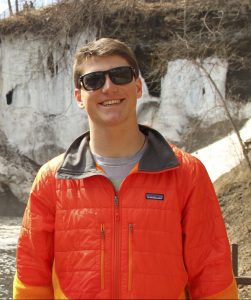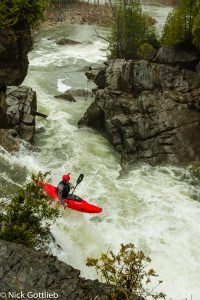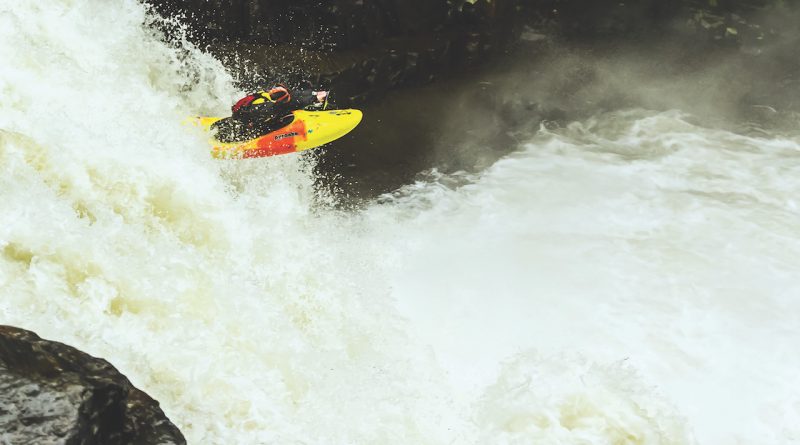Video: Meet The Whitewater Cowboy
Name: Ryan Mooney Age: 21 Hometown: Deerfield, Mass. 
Family: Mother: Jen, Father: Frank, Brother: Zach
Occupation: Student at UVM
Sports: Kayaking and skiing
At April’s New Haven Ledges, a whitewater competition that gathers the Northeast’s best kayakers to the Bristol section of the New Haven River, Ryan Mooney was a standout. The UVM freshman ran the boulder gardens, slides and waterfalls with a time of 1:47, just one second behind the winner. Mooney, a ski racer who graduated from Green Mountain Valley School, grew up in Deerfield, Mass, where his parents run Crab Apple Whitewater. Vermont Sports met up with Mooney at the race.
VS: Tell us about the New Haven Ledges Race. How did it go for you this year?
RM: It went pretty well–I ended up tied for second place. That was the fourth time competing. It was a little bit shorter this year–the week leading up to it, the water was super high all week, so they actually moved the course down halfway. The water level ended up dropping the night before, to the normal level, but at that point they couldn’t change the start. The course is usually about four minutes and twenty seconds, and this year it was just under two minutes. It was more of a sprint, rather than navigating a lot of rapids.
VS: Your family owns Crab Apple Whitewater in Massachusetts. Is that what introduced you to kayaking?
RM: My mom (Jen Mooney) is a really big whitewater kayaker. She was on the Olympic slalom team for seven years in the late 1980’s, so that’s how I got into it. My dad and my brother are really into the whole river scene. They’re kind of claustrophobic, sitting in kayaks, so they like to go on rafts and that kind of thing. I can’t think of a better way to grow up. We have raft trips that go out seven days a week during the summer, so once I was like 10 or 11 I had a kayak, and I would kayak out with the raft trips every day all summer with them on the Deerfield River.
VS: When did you start getting competitive?
RM: Maybe when I was around 14 or 15. We had a series of races down on the Deerfield River, where I’m from. It was called the Loser Cup, ironically. So those were probably my first races, down on my home stretch. It was just a bunch of guys out there, having fun.
 VS: How do you train for a whitewater race?
VS: How do you train for a whitewater race?
RM: I’m an alpine ski racer, so that keeps me in shape all winter and I kayak a lot–probably like three or four days a week. Repetition is huge. I kayak as much as I can year-round. I try to get all 12 months, but some years that doesn’t happen. Definitely at least 10 months, I’ll get out. When the rivers are flowing, you can get out and paddle as long as you have dry suits. Today’s pretty chilly (around 30º), but there have been colder days. I’ve gone out in the teens. At home, we have a calmer stretch of river, compared to this (gesturing to the New Haven). It’s more open. Paddling up the river and going against the current, that’s really good exercise. It’s mostly just getting out there and doing it as many times as you can until you get tired.
VS: Tell me about ski racing. How did you start, and where has it taken you?
RM: I learned to ski at a little hill called Berkshire East, which is in western Mass. in the town of Charlemont, where I grew up. I was about a year and ten months old when I started. I went to the Green Mountain Valley School and, I started at UVM this fall. In between, I took a couple of years off, and I was primarily focused on ski racing. I’m on the starting team for UVM’s alpine team right now. I do slalom and giant slalom. It’s really fun. We have a good team.
VS: Have you made any connection between skiing and kayaking? Do they complement each other?
RM: Oh, for sure. Skiing and kayaking–one uses legs, one uses arms–but they both require a lot of core stability. So it’s a pretty good way to cross-train and stay in shape. Also, looking ahead is huge in ski racing. You’re going really fast down a hill, and you have gates coming at you, so you’ve gotta look pretty far ahead. Kayaking is similar. You have to plan out your moves ahead of time. They both just have a really good flow to them. In ski racing, you go your fastest when you’re clean on the skis, and you’re linking up the turns. Same thing on the river. You don’t want to hit any rocks–you just want to go smoothly through. All summer, I spend every day on the river, and all winter, I spend every day on the mountain.
VS: You’ve traveled to Chile and Colorado for kayaking. Tell me about that– what did you learn there?
RM: Traveling has taught me a lot. I love to explore, and kayaking is a great way to do that and meet new people. You travel with a kayak and your camping gear, and it can take you pretty far. In Colorado, bigger mountains mean more of a gradient, so that can mean just waterfall after waterfall, or drops that can stack up and go forever.
VS: What other races have you participated in?
RM: The North Fork Championship in Idaho is probably one of my favorites. I was out there a few years ago. I qualified for the elite division race–I’d say that’s one of my best accomplishments. Only four people qualified for that race. That was pretty big.
VS: Any future plans with kayaking?
RM: Yeah, I want to do it as long as I can. Ski racing–that career will be done in a handful of years. Kayaking’s forever. I’m definitely trying to do some longer river trips, or do some trips where you spend a couple of days on the water, just living out of your kayak. There’s some places where I really want to go, such as Stikine, in British Colombia. I’d love to do some more South America stuff, or go to Europe. Norway’s big on my list right now. And I definitely want to keep competing.
VS: What would you say to someone who’s considering getting into whitewater kayaking?
RM: It’s super fun, and it’s something you can do pretty much wherever you are. There’s always water, and there’s always rivers around. Once you make the initial investment there’s no other strings attached: There’s no lift ticket fees, there’s no hotel fees. You can just do a little camping trip with your kayak. It’s really captivating once you get into it. You sort of get over the fear, and you start enjoying it more. My only recommendation would be don’t try to push it too soon. I see a lot of people getting discouraged with the sport because they go from zero to a hundred in two minutes.
video courtesy of Ryan Mooney


Pingback: Whitewater Season's Best Events - Vermont Sports Magazine